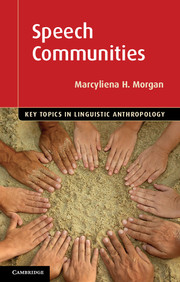Book contents
- Frontmatter
- Contents
- Acknowledgments
- Transcription Conventions
- 1 What are speech communities?
- 2 Representing speech communities
- 3 Constructing speech communities
- 4 The African American speech community
- 5 Youth communities: the Hiphop Nation
- 6 Voice and empowerment in gender and sexuality
- 7 Online speech communities
- 8 Language in and out of the classroom
- 9 Performance and play in speech communities
- 10 Power, ideology and prejudice
- Bibliography
- Index
- References
7 - Online speech communities
Published online by Cambridge University Press: 05 June 2014
- Frontmatter
- Contents
- Acknowledgments
- Transcription Conventions
- 1 What are speech communities?
- 2 Representing speech communities
- 3 Constructing speech communities
- 4 The African American speech community
- 5 Youth communities: the Hiphop Nation
- 6 Voice and empowerment in gender and sexuality
- 7 Online speech communities
- 8 Language in and out of the classroom
- 9 Performance and play in speech communities
- 10 Power, ideology and prejudice
- Bibliography
- Index
- References
Summary
This chapter explores the concept of speech community within online technology, virtual communication, media systems and institutions, social networks, communication frames, and symbolic representations and social constructions. It examines the various ways that the Internet affects and builds communities around youth culture, language, discourse, gender and sexuality, and racial and ethnic identity. As the legal scholar Lawrence Lessig argues in his book Free Culture, the Internet was built based on the tradition of free will, speech, markets, trade, enterprise and elections (2005: xiv). It developed as a culture that would be available to anyone to use, irrespective of where they are, or who they are, or what they have or don't have. The freedom of the Internet has allowed people to connect with existing communities and create new communities of interlocutors who have redefined our notion of friendship, boundaries, protest, advocacy, education, sharing and communication itself. These online speech communities have developed through an emphasis on language and discourse style, indexicality and multiple levels of intertextuality. Thus online users are, as Danet and Herring state, “members of one or more speech communities who bring to their online encounters shared knowledge, values, and expectations for linguistic interaction” (2007: 7).
Identifying speech communities
On September 2, 2005, I was on the faculty of Stanford University in Palo Alto, California and directing the Hiphop Archive. On August 29, 2005, Hurricane Katrina made landfall as a category-three hurricane in southeastern Louisiana. Katrina became one of the most destructive and deadly hurricanes in US history. The majority of deaths occurred due to the storm surge, and in New Orleans, Louisiana the levees did not hold. At least 1800 people died.
- Type
- Chapter
- Information
- Speech Communities , pp. 98 - 113Publisher: Cambridge University PressPrint publication year: 2014

